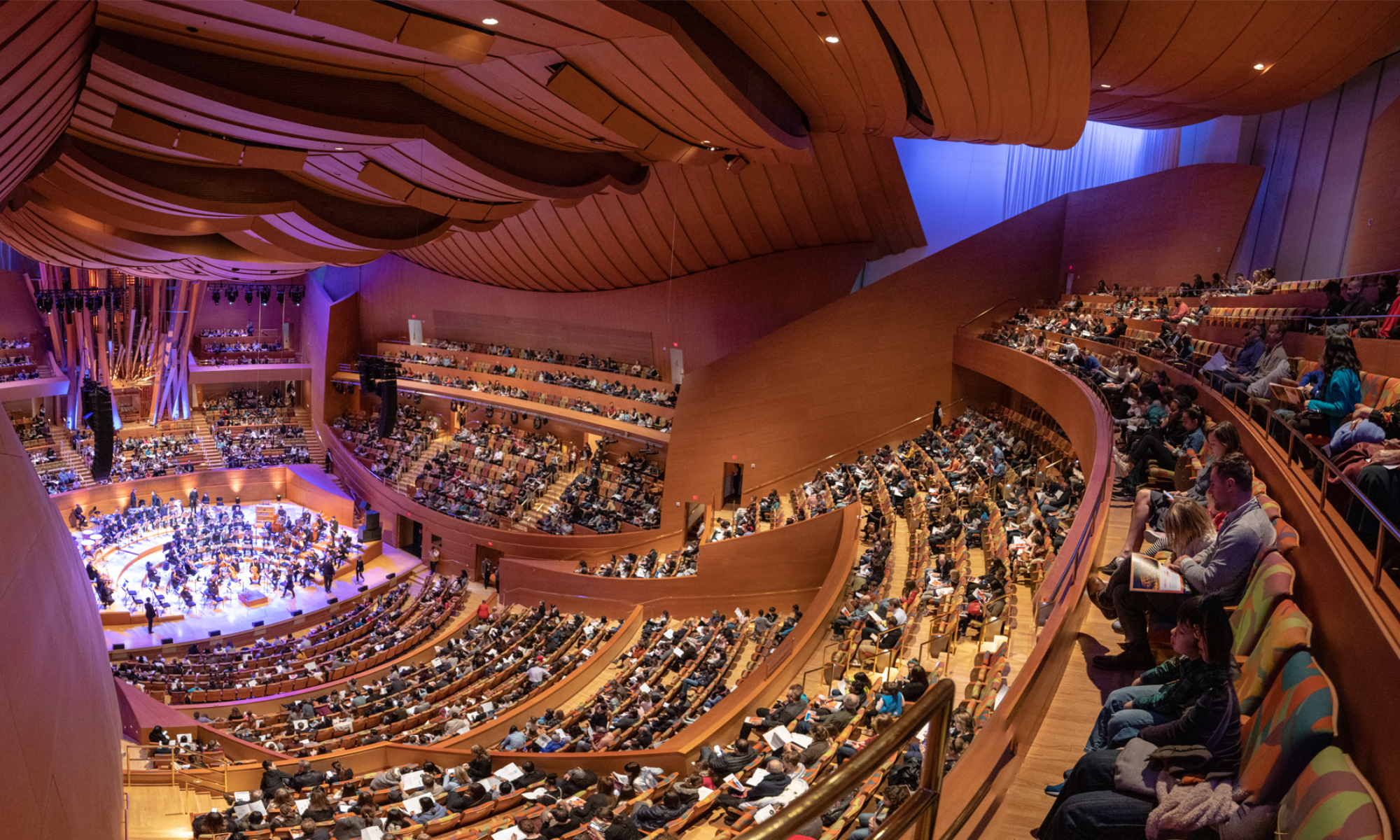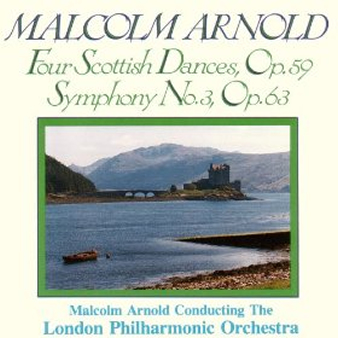London Philharmonic Orchestra – Malcolm Arnold, conductor (Phoenix)
ONE-SENTENCE REVIEW:
This recording is all about one little 3:45 piece, Scottish Dance No. 3 – Allegretto (simply beautiful) – the rest of the disc? Meh.
ORIGINAL LINER NOTES (by Paul Affelder):
If versatility is what is needed for success in the contemporary world of music, then Malcolm Arnold should fill all the requirements most commendably. As a matter of fact, he has made an enormous success of his versatility. Though his may not be a name too familiar to the average listener, that same person may, without knowing it, be humming or whistling one of Arnold’s works.
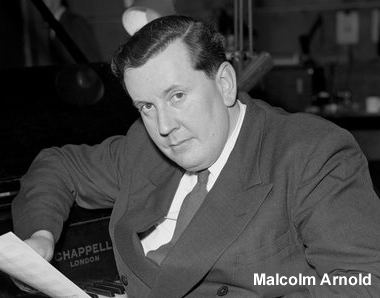 Arnold was born on October 21, 1921, at Northampton, England. Until he was thirteen, he was educated at various schools in the vicinity; then for the next four years he studied privately.
Arnold was born on October 21, 1921, at Northampton, England. Until he was thirteen, he was educated at various schools in the vicinity; then for the next four years he studied privately.
In 1938 he won a scholarship to the Royal College of Music in London, where he majored in composition under the guidance of the accomplished composer and orchestrator, Gordon Jacob. Meanwhile, he took trumpet lessons from Ernest Hall, solo trumpeter of the BBC Symphony Orchestra.
Arnold’s work at the Royal College of Music earned him the Cobbett Composition Prize in 1941. That same year, he began his career as a professional musician, joined the London Philharmonic Orchestra as third trumpeter. By the time another year had gone by, he had graduated to the first chair in the trumpet section.
He was called to military service in 1944, but received a medical discharge the following year, at which time he became second trumpeter of the BBC Symphony Orchestra.
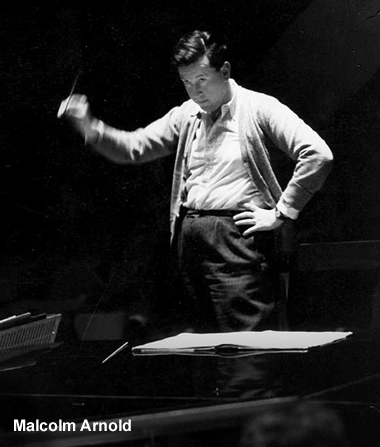 In 1946 he returned to the London Philharmonic as first trumpeter, remaining until 1948. Since that time he has devoted his talents principally to composing. While he was still in the Philharmonic, however, he gained considerable help in conducting from Eduard van Beinum who was also one of the first important conductors to give recognition to Arnold’s music.
In 1946 he returned to the London Philharmonic as first trumpeter, remaining until 1948. Since that time he has devoted his talents principally to composing. While he was still in the Philharmonic, however, he gained considerable help in conducting from Eduard van Beinum who was also one of the first important conductors to give recognition to Arnold’s music.
The music covers an exceptionally broad field. In addition to three symphonies, a sinfonietta and a serenade for orchestra, Arnold has to his credit such well-known works as the English Dances, Scottish Dances, Tam O’Shanter and Beckus the Dandipratt Overtures, and the music he wrote for the Sadler’s Wells – now the Royal – Ballet’s Homage to the Queen.
He has composed concerti for flute, oboe, clarinet, horn, organ, harmonica, and piano solo or duet, also a seranade for guitar and strings, choral music and piano pieces.
He has also been exceptionally active as a composer for the films. Included among his works in this medium are Hobson’s Choice, 1984, The Inn of the Sixth Happiness and the immensely popular Bridge on the River Kwai.
Writing in the London Musical Times, Donald Mitchell had some pertinent and revealing comments to make about Arnold’s music:
That he has, as it were, sat inside an orchestra is very evident from the natural feel of his instrumentation,” wrote Mitchell; “yet throughout his scores it is not only his intimate experience of the potentialities of an orchestra that is explicit, but also the judgment of an unusually discriminating and original ear. The pure sound of Arnold’s music is, to a degree, an expression of his exceptional musical practicality – practicality, that is, raised to the very high level of virtuosity. There is no doubt that Arnold enjoys writing music. The enjoyment he takes in his own skill he communicates to his audiences with a complete lack of inhibition. Arnold, indeed, is probably the most uninhibited of all our contemporary composers, both in what he says and how he says it. His refreshing, immodest freedom of spirit – his high spirits – are well known. It is almost impossible to write about his music without using such adjectives as ‘gay,’ ‘vital,’ ‘breezy,’ ‘humorous,’ ‘witty,’ and so on. They all, in fact, apply…”
Arnold has supplied his own notes for the music recorded here. Of the Four Scottish Dances, he writes: “These dances were composed early in 1957, and are dedicated to the BBC Light Music Festival. They are all based on original melodies but one, the melody of which was composed by Robert Burns.
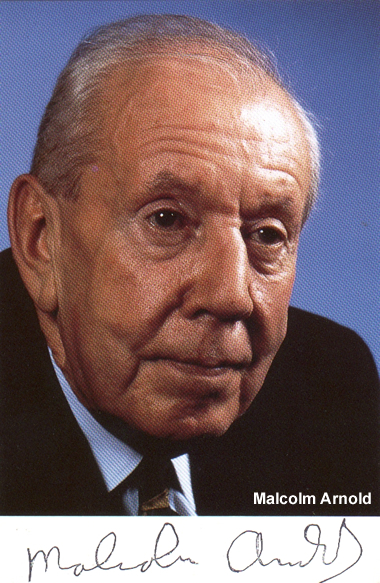 “The first dance is in the style of a slow strathspey.” (The Harvard Dictionary of Music defines Strathspey as “a slow Scottish dance in 4/4 meter, with many dotted notes, frequently in the inverted arrangement of the Scotch snap. The name, derived from the strath (valley) of the Spey, was originally coterminous with reel; later, the term reel was given to somewhat quicker dances in a more smoothly flowing rhythm, lacking dotted notes.)
“The first dance is in the style of a slow strathspey.” (The Harvard Dictionary of Music defines Strathspey as “a slow Scottish dance in 4/4 meter, with many dotted notes, frequently in the inverted arrangement of the Scotch snap. The name, derived from the strath (valley) of the Spey, was originally coterminous with reel; later, the term reel was given to somewhat quicker dances in a more smoothly flowing rhythm, lacking dotted notes.)
“The second, lively reel, begins in the key of E flat and rises a semitone each time it is played until the bassoon plays it, at a greatly reduced speed, in the key of G. The final statement of the dance is at the original speed in the home key of E flat.
“”The third dance is in the style of a Hebridean Song, and the attempts to give an impression of the sea and mountain scenery on a calm summer’s day in the Hebrides.
“The last dance is a lively fling, which makes a great deal of use of the open strings of the violins.”
Of his Symphony No. 3, the composer had this to say: “This symphony, which was composed between 1954 and 1957, is written for normal symphony orchestra without harp or percussion. It is in three movements.
“The first movement has two main subjects, the first of which is played by the violins, violas, flutes and bassoon at the very outset of the piece. Later, the second subject is first stated by the oboe accompanied by violins. Towards the end of the movement the tempo abruptly changes and the same material is developed as a scherzo.
“The second movement, elegiac in character, is a set of variations based on a series of chords more than a melodic theme.
“The last movement is based on three main themes and could be loosely described as a rondo.
“The symphony is dedicated to the Royal Liverpool Philharmonic Society.”
TRACK LISTING:
- 1: Scottish Dance No. 1 – Pesante [2:26]
- 2: Scottish Dance No. 2 – Vivace [2:04]
- 3: Scottish Dance No. 3 – Allegretto [3:45]
- 4: Scottish Dance No. 4 – Con brio [1:13]
- 5-7: Symphony No. 3, Op. 63
FINAL THOUGHT:
Malcolm Arnold’s talent was as a film composer (Bridge on the River Kwai, et al) and not as a symphonic composer. There’s not much to love in Symphony No. 3 (or the other eight, in my opinion). I realize some consider his symphonic work his most important – I’m not one of them. The highlight of this CD is the simplest tune of them all – Scottish Dance No. 3 – the Allegretto – a truly gorgeous melody.
 Emily Sachs – President – Manka Music Group (A division of Manka Bros. Studios – The World’s Largest Media Company)
Emily Sachs – President – Manka Music Group (A division of Manka Bros. Studios – The World’s Largest Media Company)
